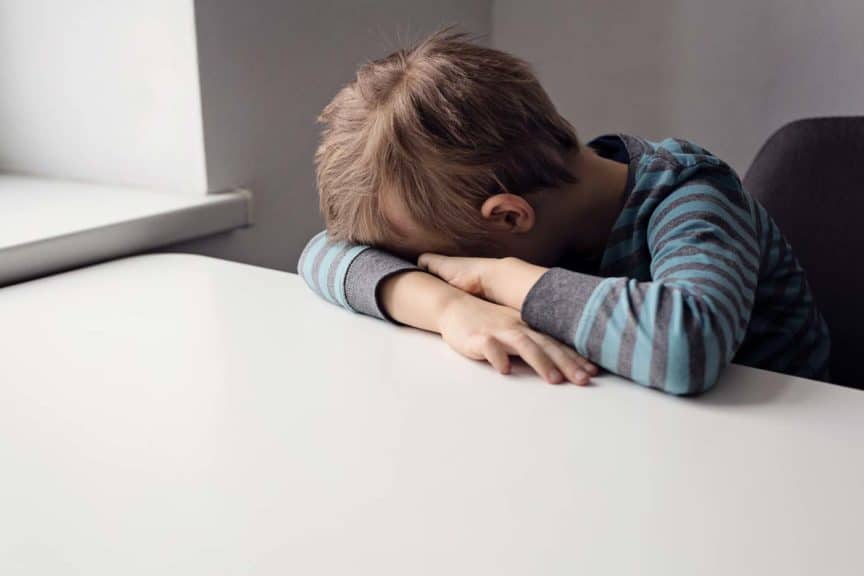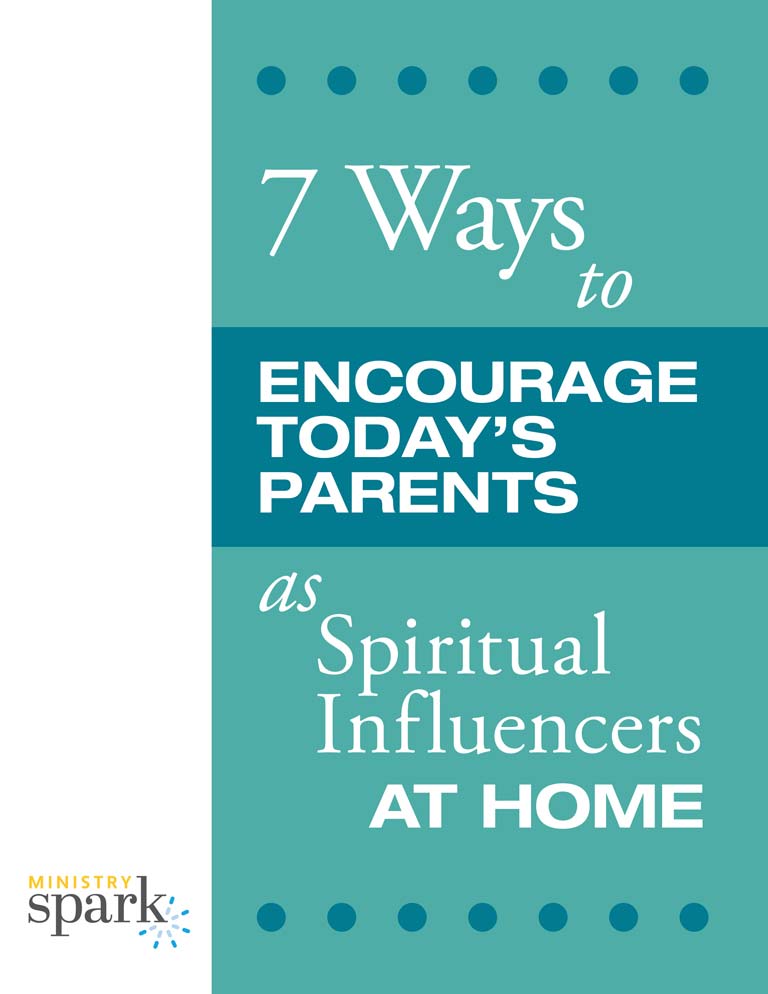Bullying is something people have struggled with for thousands of years, but the methods and styles of bullying have changed over time. Consequently, if you’re planning how to stop bullying in your kids’ ministry, there are several factors to consider.
What Is Bullying?
It all started when sin and brokenness entered the world when Adam and Eve sinned in the Garden of Eden (Genesis 3:1–24).
After sin entered the world, every human born was born with a tendency toward sin and selfishness.
There are many examples from the Bible and from history of people being treated poorly and unfairly. And we know many people experience bullying today, even though it is not God’s plan for how His people treat one another.
The Centers for Disease Control and Department of Education define bullying as unwanted aggressive behavior; observed or perceived power imbalance; and repetition of behaviors or high likelihood of repetition.
Bullying can be direct (such as name-calling or physical violence) or indirect (spreading rumors, excluding someone).
Bullying takes on many forms. It may be:
- physical—such as hitting or spitting on someone or damaging someone’s property (such as damaging someone’s locker at school)
- relational—hurting someone’s reputation
- verbal—this includes in-person verbal remarks and electronic or cyberbullying
Bullying can be physical, relational, or verbal.
In the past, kids tended to be bullied only when they were around other kids. Today’s kids are the first generation to grow up with digital access their entire lives.

With tablets, cell phones, social media, video games, and the internet, cyberbullying can occur at any time. And cyberbullying can be particularly harmful and destructive.
According to Stopbullying.gov, bullying called cyberbullying can occur through any digital device, such as phones, tablets, apps, or video games.
It includes “sending, posting, or sharing negative, harmful, false, or mean content about someone else. It can include sharing personal or private information about someone else causing embarrassment or humiliation.”
Why Do People Bully?
Kids who bully may be acting out their aggression because of a situation that is out their control in their personal lives.
They may have experienced a stressful or traumatic situation, or may have had bullying behavior modeled in their lives. They might bully due to low self-esteem or being bullied themselves.
If we want to know how to stop bullying, we need to seek to understand and reach out to those who are doing the bullying. These are often kids who need support, help, and love.
When Bullying Is Deadly
Suicide is the second leading cause of death among kids ages 10-24. The Pediatric Academic Society reports that the number of kids hospitalized for suicidal thoughts or actions doubled from 2008 to 2015.
In 2017, Netflix released 13 Reasons Why, an original fictional series based on a book by the same name.
The series chronicled the tragic events leading to a young girl’s suicide. Her story includes issues such as sexual assault, substance abuse, mental illness, bullying, and suicide.
The show struck a chord with many teenagers because of its relatability in issues teenagers face every day.
Young people who are bullied and who are bullying are more likely to commit suicide or engage in suicidal behavior, according to the Centers for Disease Control and Prevention.
Young people who are bullied and who are bullying are more likely to commit suicide.
The youth with the most significant risk for suicide are those who have disabilities, learning differences, or who are LGBTQ.
One study showed that 60% of the kids age 5-11 who committed suicide lived with ADD or ADHD—not depression—and most of them had relationship problems with family members.

Consequently, suicide among children is usually the result of impulsivity, rather than long period of depression.
Conversely, youth who feel connected with a strong support system, and who have strong role models in their lives are less likely to engage in suicidal behavior.
If a kid or teen shows signs of suicidal behavior or thoughts, such as harming themselves or talking about harming themselves, refer them to a professional counselor immediately and remind them you support and care for them.
What Does The Bible Say About Bullying?
Once sin entered the world through Adam and Eve, all people were born with sin inside them. Sin leads to selfishness and treating others in unkind ways.
There are many examples of people being treated badly in the Bible, starting with Cain killing his brother Abel, the people hurting each other during Noah’s lifetime before the Flood, and all the way to the times of Jesus when people were treated as outcasts because of illness, physical limitations, or because of the family they were born into.
Even Jesus—perfect and above reproach—was treated terribly and killed.
How to Treat Others
Jesus showed us how He wants us to treat others and also shared some principles to help us.
In Mark 12:31, Jesus said the greatest commandment is to “Love the Lord your God with all your heart and all your soul, and all your mind, and all your strength. And love your neighbor as yourself.”
In Luke 6, Jesus commanded us to love our enemies and those who treat us poorly, and to treat others as we want to be treated.
Standing Up for Someone Else
Jesus calls us to treat others with love and kindness, following His example. What does this mean for those who witness others being bullied?
The Bible tells us to seek justice and stand up for people who are treated unfairly (Psalm 82:3-4; Isaiah 1:17). Therefore when we witness bullying, we need to stand up for those who are being bullied and report the bullying.
Forgiveness
For those who have hurt others, Jesus offers forgiveness and grace. Those who have bullied others can turn away from the wrong things they have done, and let Jesus renew their hearts (1 John 1:9; 2 Corinthians 5:17).
Jesus offers forgiveness and renewal for everyone, no matter what we have done.
Justice
The Bible offers hope to those who are being bullied. One day we will live in a world where wrongs will be made right, justice will be served, and we won’t have to suffer anymore.
And until that time, it is not our job to seek revenge or to hurt people who have hurt us.
The person being bullied can stand up for themselves and for what is right, report the bullying to a trusted adult, and pray for the person who is doing the bullying.

How to Stop Bullying at Church
To stop bullying at your church, take the following steps:
Create a Safe Environment
Bullying is more likely to occur when kids are bored or not well supervised. So it’s important to enlist enough volunteers and leaders in your church to provide adequate leader-to-child ratios.
It’s also wise to structure your environment strategically—the class rules you post and the way your train your volunteers to enforce the rules is important. And be sure to look for opportunities to call out positive examples and talk about kindness and compassion often.
Support the Bullying Child and Family
Kids who bully are more likely to have parents who are less present and involved in their lives than kids who do not bully.
When parents are transformed by their faith, lead their kids spiritually, and teach about compassion and kindness in the home, kids are less likely to bully others.
You can reach and teach parents through small groups, mentors, and Sunday morning worship services and teaching.
Offer Support for Kids Who Have Been Bullied
There are many ways to help people who have been hurt by others. Pray with and for them. Offer referrals to trusted and licensed family counselors. Extend community and support.
You may not be able to fix or solve their problems, but you can offer empathy. You can remind them of their value and worth to God and encourage them to seek their identity from Him—not from others.
Create Rules and Procedures to Minimize the Risk
You can reduce the chances of bullying in your church by having healthy ratios of trained, responsible adults in every group of kids.
Train your leaders to identify kids who may be targets of bullying and who may be the instigators. Coach them to take action immediately if they see kids being bullied.
Setting expectations for respect and kindness from the very beginning, and reminding kids of those expectations regularly can help stop bullying from happening.
Implement a zero-tolerance policy for violence in your ministry—anytime a child is intentionally violent toward another child or adult, contact the child’s parents immediately.
You may need to sit down with the child’s parents or guardians to come up with a plan to help the child before that child can be a part of the children’s ministry again. It’s important to avoid shaming the child and the parents.
Train Leaders to LOOK, STOP, and PREVENT
Look for warning signs—not just physical violence, but also rumors and tendencies toward isolation. Look for kids who are potential targets, who are new to the church, or who seem isolated.
Stop bullying immediately when they see it or when it is reported.
Prevent bullying by actively engaging all kids and reminding them of the expectations to treat others with kindness regularly.

Ready to help parents create an environment for spiritual growth?

Ready to help parents create an environment for spiritual growth?

Ready to help parents create an environment for spiritual growth?
How to Help Victims
When a child admits to being bullied, show them empathy rather than overreacting or trying to fix the situation immediately.
Create an atmosphere of safety where they are comfortable sharing and feel cared for. Then remind the child their identity is in Christ and they are worthy and loved by Him.
If kids are being cyberbullied, parents or guardians should be notified. The child may need to be removed or separated from the device or online account where the bullying occurred.
Parents need to closely monitor all online and social media their kids use.
They can set time limits for kids with devices. Products like Circle with Disney help parents set limits and manage their kids’ devices.
Bark is another program parents can use to help monitor their kids’ devices. This program sends notifications when kids are at risk with harmful data or content on their devices.
When kids are bullied, they may withdraw from their friendships and extracurricular activities or may act out with destructive behavior. They may attempt to get revenge on their bully or become aggressive.
Kids who experience bullying need adults to help them process their feelings and respond in healthy ways.

When we coach kids, they can respond to bullying with confidence and stand up for themselves without retaliating or seeking revenge.
We can also teach kids to separate themselves from the situations and atmospheres where bullying tends to happen.
And we can help kids understand why people bully and even pray for those who are hurting them.
What about “Turning the Other Cheek?”
If anyone slaps you on the right cheek, turn to them the other cheek also (Matthew 5:39, NIV). Some interpret this verse (also taught in Luke 6:29) to mean Christians should not stand up for themselves. But other scholars interpret these passages in different ways.
Some Bible scholars say the phrase “slaps you on the right cheek” refers to a figurative “slap” and not a physical act of violence. In cultural context, the phrase Jesus uses signifies a “deep insult.” He admonishes us not to retaliate.
Jesus Himself, when physically slapped, questioned His accusers. And kids who are being physically hurt by someone else can physically stand up for themselves if they are able. Or they can leave the situation and tell a trusted adult.
How to Encourage Kids Who Have Been Bullied
It is essential for kids who have experienced bullying to know that God loves and values them. They need to understand their worth and identity.
Remind them often who they are in Christ—a child of God (1 John 5:1).
Remind them God has not given them a spirit of timidity, but of power, love and a sound mind (2 Timothy 1:7) and that they are conquerors through Christ (Romans 8:37).
Help them carry Scriptures with them (whether physical cards or memorized verses) to remind them of their identity in Christ and the love God has for them.
Jesus gives an example of how to respond to bullying with confidence, grace, and forgiveness.
Jesus’ contemporaries treated Him unfairly and unjustly, and He was perfect. We can follow in Jesus’ footsteps and teach others to do the same by showing strength and also forgiveness to those who have hurt us.
What You Can Do to Stop Bullying
We can help kids deal with bullying by helping them:
- manage their emotions
- stand up for themselves
- learn to problem solve
- surround themselves with the right people
- treat others with kindness
- make wise choices
We need to encourage kids to look out for people being treated unfairly and to stand up for them.
To help stop bullying, parents, church leaders, community leaders, and educators should be aware of the warning signs and work together to create safe and healthy environments for kids.
Offer support to kids who have bullied and who have been victimized to help them heal.
Jesus taught the “golden rule” to “Treat others as you want them to treat you” (Matthew 7:12).
This is more than just a good saying. The “Golden Rule” is the Christ follower’s way of life. We must model and teach this attitude over and over until it’s ingrained in our kids’ hearts.
Empathy and love are the opposite of bullying, and the biggest part of the solution. And when we model this, teach this, and encourage this in kids, we can help stop bullying.








